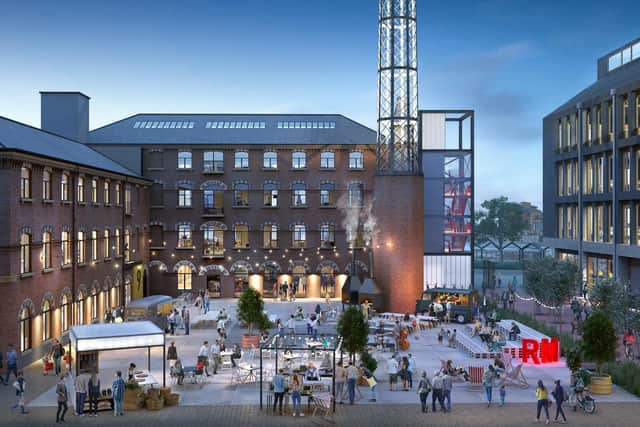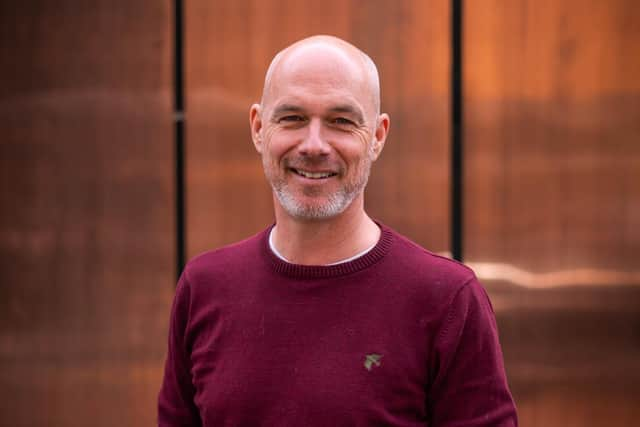Tileyard North: How dilapidated Wakefield mill complex is being transformed into creative hub of the north
Nick Keynes is on a journey in more than one sense of the word.
He is one of the co-founders of Tileyard London, Europe’s largest music-centric creative community. He is also one of the team on a mission to replicate that community in the north, a team whose multi-million pound transformation of a derelict former mill complex in Wakefield is well under way.
Advertisement
Hide AdAdvertisement
Hide AdNick is on the road, heading northbound to the city, when we speak. Since Tileyard North’s conception around five years ago, it’s become a familiar route.


He’s been in talks with people from across Yorkshire’s creative community – and, as the opening of phase one of the development draws closer, those conversations are amplifying.
“It’s been great watching the project develop,” Keynes muses. “It’s a massive undertaking and it makes you realise actually why the buildings have been in such a state of disrepair for so long.
“It’s a huge amount of investment required to get them back to their former glory, which will be well worth it. Now’s the bit where the fun really starts, talking to people who will be forming the early part of the community.”


Advertisement
Hide AdAdvertisement
Hide AdThere are plans for workshops and studios, conference and events space, bar, restaurant and cafe facilities and education space. It will be a place for people to work in a curated, creative community, with public spaces designed for everyone to experience.
“When we set up in London, a creative community among particularly the independent music sector just didn’t exist,” Keynes says. “I think the same thing is missing in the north is this creative community…
“What we’ve seen in London is the success of building community. Businesses have started up that otherwise wouldn’t have existed, careers have started that otherwise wouldn’t have existed. Hits have been written and produced and had by artists, start-ups have gone on to build and grow and to take more space and employ more people.
“A big thing for us also with Tileyard North is retention of talent. I’ve met a lot of people who have said I grew up in Wakefield but I don’t live there anymore – they felt in order to be successful they had to go somewhere else. Actually if you can give people an opportunity to belong to a community, it’s a good reason to stay.”
Advertisement
Hide AdAdvertisement
Hide AdIt is hoped the first stage of Tileyard North will open in October - including 25 studios and a large events space. Those already lined up to join the community include Musiio, a fast-growing innovative tech start-up which uses Artificial Intelligence to automate music workflows. The Yorkshire Catering Company, which runs The Yorkshire Deli restaurant in Wakefield, is also set to have a dining and events space – and there are plans for local firm Forged Spirits to relocate to Tileyard, with a distillery and bar.
As for the studios, there will be a mix of space including for podcasting, music, design and photography. Some will be for a core residential community of businesses, based on the premises, whilst others will be set aside for a membership scheme, in which individuals and organisations will be able to pay a subscription to access facilities. “Stills, moving picture, podcast, audio can all be done on site and will be ready to go from this first phase,” Keynes says.
Levelling up funding from the Government will support the later stages of development, including more studio space and offices. One of the key elements also still to come is a hotel.
“We absolutely want to have a hotel as part of the campus,” Keynes tells me. “We feel there’s a real opportunity and a lack of the right kind of hotel offering in the city. We have been coming up now for the best part of five years and we’re not exactly spoilt for choice.”
Advertisement
Hide AdAdvertisement
Hide AdQuite how a dilapidated mill complex, dating back to 1872, ended up being chosen for the site of Tileyard North is somewhat serendipitous.
Standing next to the award-winning gallery The Hepworth Wakefield on the city’s waterfront, Rutland Mills caught the eye of art lover Paul Kempe, a property developer and one of Tileyard London’s founders.
Kempe had been visiting The Hepworth and the neighbouring buildings, disused since 1999, piqued his interest. “He asked the question what’s the story with those and the next thing you know he’s agreed to buy them and regenerate them,” Keynes says.
“If it hadn’t been for The Hepworth, we wouldn’t be there. It was a major draw for us. And then we realised how accessible Wakefield was geographically too.”
Advertisement
Hide AdAdvertisement
Hide AdKempe and Keynes were inspired to expand Europe’s largest creative community – Tileyard London – into Rutland Mills.
Kempe’s vision for the northern extension is “a vibrant destination for creative and collaborative partnerships in music, film, TV, design, new media and indeed all facets of the commercial creative sector” which he and his team believe will help to establish new business relationships and networks, create new job opportunities and empower people in creative sectors across Yorkshire and the north.
It’s quite the vision, but it’s fair to say they have the credentials. Since its inception in 2011, Tileyard London has grown from a compact 10-music studio complex into a thriving ecosystem of over 250 studios, organisations, artists and independent creative industry businesses, including an educational and training facility. Based in London’s Kings Cross, it is home to the likes of Apple Music 1, Noel Gallagher, The Prodigy and SoundCloud.
“It would have been so obvious to go to Manchester or Leeds and Wakefield felt a bit cooler and less obvious. It’s slightly closer to London and easy to get to by rail and by car. It ticked the boxes.”
Advertisement
Hide AdAdvertisement
Hide Ad“If you look at what Wakefield has to offer,” Keynes continues, “with The Hepworth, Yorkshire Sculpture Park, (live events community) Production Park, now us, actually most cities would love to have just one of those.
“The fact Wakefield has all four now is super exciting. We’ve always been looking to compliment what’s already there...There’s four really significant creative and cultural set-ups in and around Wakefield and I think there’s every reason why Wakefield can really emerge as a major player.”
The development for Keynes and the team goes much broader though – they see Tileyard North as being a creative community for the whole Yorkshire region, and indeed the north.
“There is an abundance of talent in the region,” he says, “and our mission is to harness this by creating a home and a place to belong.”
